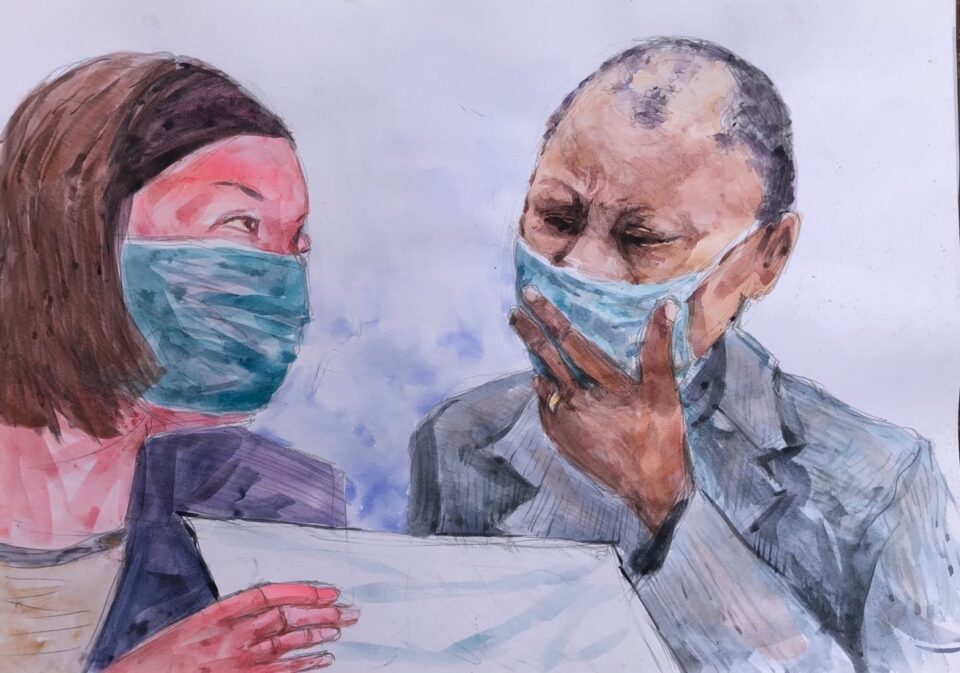PHOTO: Gibril Massaquoi in a conversation with Paula Sallinen, one of his lawyers. Credit: Laslie Lumeh/New Narratives
By Evelyn Kpadeh Seagbeh with New Narratives
MONROVIA, Liberia—A witness, claiming to be a former Liberian army soldier, has accused the Sierra Leonean man facing charges for alleged gross human rights violations in Liberia of ordering massacre at Waterside in Monrovia.
“Soldier 15,” who like all other witnesses, cannot be named for protection from reprisal, told Finland’s Turku Court of Appeals that the civilians had gone allegedly loot from a store when Gibril Massaquoi ordered their killings.
But he was quick to admit that he not physically present when the alleged incident happened.
“When I got there, that morning I saw 6 dead bodies,” said Soldier 15. “So, when we asked the civilians who killed the people, they said it was Gibril and his people and it was that same morning Salami died on the bridge.”
“So, I called him (Gibril) and asked him, and he told me it is because the people were looting,” he said.
The Court has heard a similar testimony from many witnesses about the alleged killings in the area, which are at the heart of this appeal hearing. “Angel Gabriel,” an infamous nickname many witnesses have alleged Massaquoi used before killing civilians or fellow soldiers, is also at issue in these proceedings. But, as they did in the District Court, which, nearly a year ago, acquitted Massaquoi, a former commander of Sierra Leone’s Revolutionary United Front (RUF), of all charges, including murder, rape, and torture because they were not proven by prosecutors “beyond a reasonable doubt,” Masssquoi’s lawyers are arguing on appeal that the witnesses are talking about a different person. They are also arguing that he was providing information to the then-UN-backed Special Court for Sierra Leone at the time witnesses have alleged he committed the crimes. But Wednesday’s witness insisted he fought alongside Massaquoi during the years in dispute.
“Yes, I know Gibril Massaquoi because, we all used to fight together from 2001 to 2002 for [Charles] Taylor, he said. “He [Massaquoi] was with the RUF.”
Soldier 15 alleged he was a part of the Liberian government troops that fought alongside the RUF soldiers to push back rebels from the Liberians United for Reconciliation and Democracy during those years, and also in 2003.
He Massaquoi and his RUF fighters had operated in parts of Lofa County, before moving to Monrovia. The ex-Liberian soldier said in Monrovia, the RUF soldiers were based at Waterside.
The former government fighter also confirmed seeing other two civilians’ corpses at Water Street intersection that same day totaling eight.
He also said he was part of a group of former Sierra Leonean rebels that brunt people alive in Lofa County.
But “Defense 40,” a defense witness, and a Sierra Leonean, denied Massaquoi’s participation in the war.
He did however confirm the testimonies of other witnesses that worked as a special assistant to Foday Sankoh, the RUF leader. The witness claimed this happened in 1999 and that Massaqioi relayed Sankoh’s instructions to the soldiers on the frontlines.
He said after an attack on Sankoh’s home in Free Town on May 8, 2000, they all fled and he to Liberia.
The hearings continue on Thursday.
The coverage of the appeal of Massaquoi’s acquittal is a collaboration with New Narratives as part of the West Africa Justice Reporting Project.

